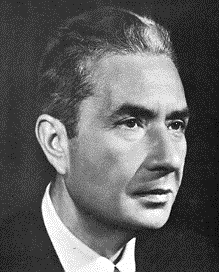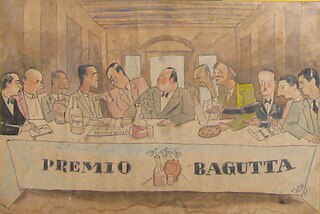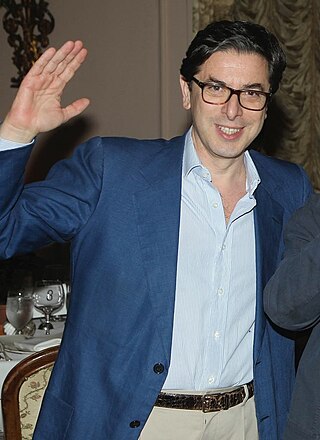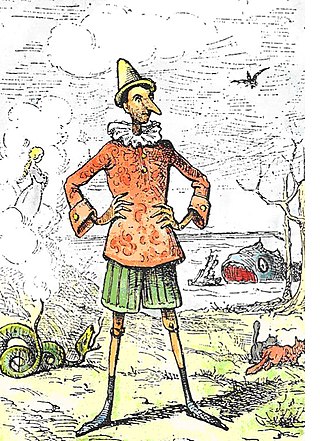
Tullio Avoledo (born 1 June 1957) is an Italian novelist. [1]

Tullio Avoledo (born 1 June 1957) is an Italian novelist. [1]
Avoledo was born in Valvasone, in Friuli. After earning a degree in law, he worked as a legal counselor for banks.
His first novel, L'elenco telefonico di Atlantide, was released in January 2003 by the minor Italian publisher Sironi. It turned into a best-seller and won the Fort Village Montblanc Award for the best debutant writer. Avoledo could pull the reader into a science-fictional narrative involving a mysterious global plot and a character modeled on himself. Mare di Bering, his second novel, was published in November of the same year.
His last novel for Sironi was Lo stato dell'unione in 2005. In the same year his first novel for Einaudi, one of the most renowned Italian publishers (which had also issued pocket editions of the former two), was released, under the title Tre sono le cose misteriose. Avoledo won the prestigious Grinzane Award with this fourth book in 2006.
The following Breve storia di lunghi tradimenti loosely alludes to characters (like Giulio Rovedo and Cecilia Mazzi) and situations of L'elenco telefonico di Atlantide, but it has a new plot set in a world of global economics and of industrial delocalization. A movie inspired by this novel was released in 2013.
La ragazza di Vajont is set in a dystopian alternate Italy dominated by a fascist regime, and plunged into a seemingly endless winter.</ref> [2]
L'ultimo giorno felice is a short novel which Avoledo wrote for Legambiente, an Italian environmental organization. The plot is centered on the predicament of a young architect, Francesco Salvador, selling his soul to the mafia for money. The novel describes the last hours of Francesco, during an exclusive tour of the Venetian lagoon.
Science fiction is often present in the works of Avoledo. Avoledo's novel L'anno dei dodici inverni (2009) deals with time travel, love and redemption, in a mix of science fiction themes and a realistic narrative approach to the feelings and emotions of the characters. In 2011 he published another science fiction novel, Un buon posto per morire, in collaboration with Davide "Boosta" Dileo, keyboard player of the Turinese band Subsonica. The novel won the Emilio Salgari Prize 2012 for best Italian adventure novel.
He also wrote Metro 2033: Le radici del cielo, and Metro 2033: La crociata dei bambini written for the Metro 2033 Universe project set up by Dmitry Glukhovski. Both books have been published in Italy by Multiplayer.it. The last novel of the Metro 2033 trilogy - Metro 2033: Il Conclave delle tenebre will be published in 2018.
Tullio Avoledo ran for the Italian Senate at the national elections on March 5, 2018, as a member of the Friulan party "Patto per l'Autonomia".
His novel Nero come la notte (Marsilio, 2020) won the Scerbanenco Award for the best Italian crime novel.
The last novel by Avoledo is Non è mai notte quando muori published by Marsilio in 2022.

Aldo Romeo Luigi Moro was an Italian statesman and prominent member of Christian Democracy (DC) and its centre-left wing. He served as prime minister of Italy in five terms from December 1963 to June 1968 and from November 1974 to July 1976.

Futurism was an artistic and social movement that originated in Italy, and to a lesser extent in other countries, in the early 20th century. It emphasized dynamism, speed, technology, youth, violence, and objects such as the car, the airplane, and the industrial city. Its key figures included Italian artists Filippo Tommaso Marinetti, Umberto Boccioni, Carlo Carrà, Fortunato Depero, Gino Severini, Giacomo Balla, and Luigi Russolo. Italian Futurism glorified modernity and, according to its doctrine, "aimed to liberate Italy from the weight of its past." Important Futurist works included Marinetti's 1909 Manifesto of Futurism, Boccioni's 1913 sculpture Unique Forms of Continuity in Space, Balla's 1913–1914 painting Abstract Speed + Sound, and Russolo's The Art of Noises (1913).

Francesco Guccini is an Italian singer, songwriter, actor, and writer. During the five decades of his music career he has recorded 16 studio albums and collections, and 6 live albums. He is also a writer, having published autobiographic and noir novels, and a comics writer. Guccini also worked as actor, soundtrack composer, lexicographer and dialectologist.

Emilio Salgari was an Italian writer of action adventure swashbucklers and a pioneer of science fiction.

Geronimo Stilton is an Italian children's chapter book series created by Elisabetta Dami and written under the pen name of the title character. Scholastic Corporation began publishing the English version of the series in the US in February 2004. In the UK, the English books are published by Sweet Cherry Publishing. The series is set on a fictional version of Earth dominated by anthropomorphic mice and rats and focuses on the title character, a mouse who lives in New Mouse City on Mouse Island. A best-selling author in-universe, Geronimo Stilton, works as editor and publisher for the newspaper, The Rodent's Gazette. He has a younger sister named Thea Stilton, a cousin named Trap Stilton, and a nephew, nine-year-old Benjamin Stilton. Geronimo is a nervous, mild-mannered mouse who prefers a quiet life, yet keeps getting into faraway adventures with Thea, Trap, and Benjamin in both fictional and real locations. The books are written as fictional memoirs of him on these adventures. The books are designed and distributed in full color, depicting important words in the text as colored and in illustrative typefaces.

Liliana Cavani is an Italian film director and screenwriter. Cavani became internationally known after the success of her 1974 feature film Il portiere di notte. Her films have historical concerns. In addition to feature films and documentaries, she has also directed opera.

The literary genre of science fiction is diverse, and its exact definition remains a contested question among both scholars and devotees. This lack of consensus is reflected in debates about the genre's history, particularly over determining its exact origins. There are two broad camps of thought, one that identifies the genre's roots in early fantastical works such as the Sumerian Epic of Gilgamesh. A second approach argues that science fiction only became possible sometime between the 17th and early 19th centuries, following the scientific revolution and major discoveries in astronomy, physics, and mathematics.

The Bagutta Prize is an Italian literary prize that is awarded annually to Italian writers. The prize originated among patrons of Milan's Bagutta Ristorante. The writer Riccardo Bacchelli discovered the restaurant and soon he regularly gathered numerous friends who would dine there together and discuss books. They began charging fines to the person who arrived last to an appointed meal, or who failed to appear.
Franco Lucentini was an Italian writer, journalist, translator and editor of anthologies.

Carlo Fruttero was an Italian writer, journalist, translator and editor of anthologies.

Antonio Monda is an Italian writer, filmmaker, essayist, and professor at New York University's Tisch School of the Arts. He is a promoter of the arts, in particular film and literature.

Pinocchio is a fictional character and the protagonist of the children's novel The Adventures of Pinocchio (1883) by Italian writer Carlo Collodi of Florence, Tuscany. Pinocchio was carved by a woodcarver named Geppetto in a Tuscan village. He is created as a wooden puppet, but he dreams of becoming a real boy. He is known for his long nose, which grows when he lies.
Fantacollana was a series of fantasy books published in Italy by Editrice Nord. The first number, issued in May 1973, featured The Jewels of Aptor by Samuel R. Delany. The first issues, edited by Riccardo Valla, featured covers by artists such as Karel Thole, Michael Whelan and Frank Frazetta. Valla was replaced in the mid-1970s by Sandro Pergameno, who was followed by Alex Voglino.
Lino Aldani was an Italian science fiction writer.
The Acqui Award of History is an Italian prize. The prize was founded in 1968 for remembering the victims of the Acqui Military Division who died in Cefalonia fighting against the Nazis. The jury is composed of seven members: six full professors of history and a group of sixty (60) ordinary readers who have just one representative in the jury. The Acqui Award Prize is divided into three sections: history, popular history, and historical novels. A special prize entitled “Witness to the Times,” given to individual personalities known for their cultural contributions and who have distinguished themselves in describing historical events and contemporary society, may also be conferred. Beginning in 2003 special recognition for work in multimedia and iconography--”History through Images”—was instituted.
Metro, is a post-apocalyptic fiction franchise consisting primarily of novels and video games that began with the 2005 release of Russian writer Dmitry Glukhovsky's novel Metro 2033. It was followed by his sequels Metro 2034 and Metro 2035, as well as by many other books by different authors, including Tullio Avoledo, Pierre Bordage, Robert J. Szmidt and Shimun Vrochek. Ukrainian studio 4A Games created the original novel's video game adapatation Metro 2033, followed by Metro: Last Light and Metro Exodus.
The filmography on immigration in Italy is a phenomenon started with the arrival of the first migratory flows in Italy, since the 1990s.

Michele Rech, known as Zerocalcare, is an Italian cartoonist. His pen name, literally meaning "zero limescale", was inspired by an Italian TV commercial jingle for a descaler product, and was chosen when he needed a nickname to quickly join a discussion on the Internet.

Oreste Del Buono was an Italian author, journalist, translator, literary critic and screenwriter.

Vincenzo Ferrera is an Italian actor.